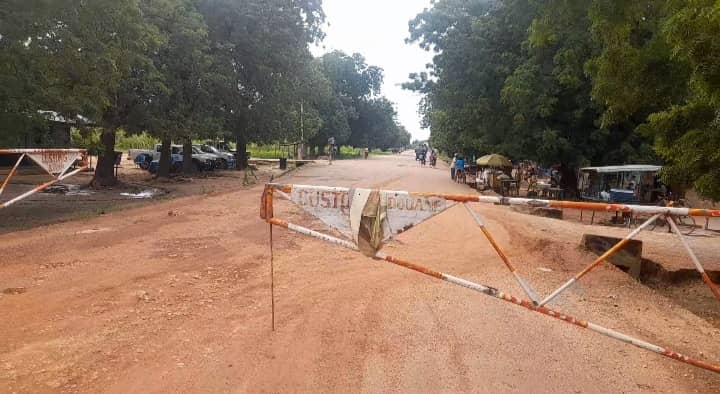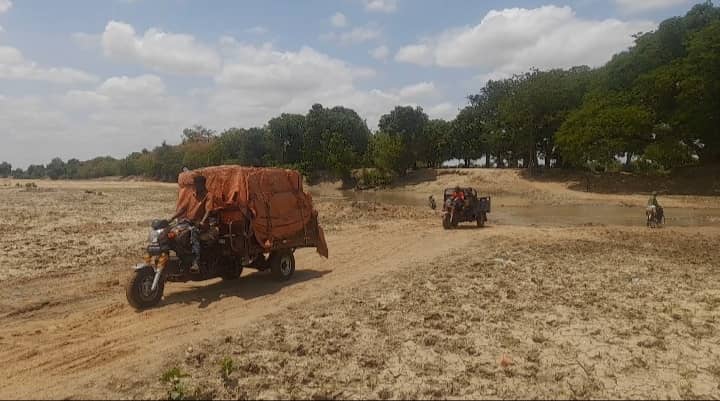Ghana-Burkina Faso border points have proved convenient conduits for the illegal movement of large volumes of cargo either way across them, a media investigation has established.
On any given day, there is a hive of activity as a wide range of goods such as fertilisers, petroleum products, soft drinks, yam, wood and second-hand bicycles make their way through unapproved routes. Unverified allegations are that the activities take place unchecked due to the active involvement of influential people in the smuggling rackets.
This reporter visited Mognori in the Bawku Municipality, one of the major borders. Even with security personnel nearby, tricycles with huge loads of goods made their way across, completely unhindered.
Several activities at these borders are compounding the problem of large scale illicit financial flows. In some of the cases, goods find their way out of the country through unapproved routes while others are channelled through the approved routes. What is worse, some influential and high profile personalities have been seen muscling their way through the borders with huge consignments of goods like fertiliser and soft drinks among others. Fuel stations have also sprung up in some communities in the border areas to service the resultant business which has arisen as vehicles move in and out continuously.
‘SMALL ITEMS’
Assembly member for the Mognori electoral area, Seidu Salifu – who is the local leader of the Ghanaian community which shares the boundary with Burkina Faso – downplayed the extent of the problem, saying the goods being moved were only small items such as groceries. He said most of the activities took place because of the social relationship between some of his electorates and the residents of the closer Burkinabe community.
Azonko is a local security guard at the Mognori river. His main activities include assisting Ghanaians coming from Burkina Faso to cross the river to Ghana without any hindrance.

He said, “Most of the people come from Burkina Faso to buy drinks, bicycles and other variety of goods. Everyone is chasing his own business.”
ALARMING RATE
Border officials at the Zebilla Barrier in the Upper East Region expressed alarm at the rate at which activities of traders within the border areas were increasing. They said they feared Ghana could be losing millions of cedis every year due to these activities.
A truck driver confided to me. “I came with my truck fully loaded with fertiliser. Everything is going to Burkina Faso; however, I have refused for my vehicle to go, so they want to transfer to a different vehicle and transport it there.”
Some of the main Ghanaian borders to Burkina Faso include Kalba, Hamile, Wechiau, Kolingwu, Tumu, Kwonehogo all in the Upper West Region of Ghana; and Paga, Gulen, Bongo, Nangodi, Lamboya, Mognore, Kulugungu in the Upper East Region of Ghana. From the Burkinabe end to Ghana, some of the main border communities include Dankana, Batie Nord, Ouessa, Boura, Léo, Bieha, Songo, Youga.
Security agencies from both Burkina Faso and Ghana are stationed at these borders to collect revenue, regulate the entry and exit of people and to foil the smuggling of goods in and out of these boundaries. The continued – and even increasing – levels of smuggling however suggests that this mission is not succeeding as efficiently as it could, with some of the officials thought to be compromised or failing to cope with advanced methods of smuggling.
“The project received support from the Thomson Reuters Foundation through the Media Foundation for West Africa, as part of its global work aiming to strengthen free, fair and informed societies. Any financial assistance or support provided to the journalist has no editorial influence. The content of this article belongs solely to the author and is not endorsed by or associated with the Thomson Reuters Foundation, Thomson Reuters, Reuters, nor any other affiliates.”


